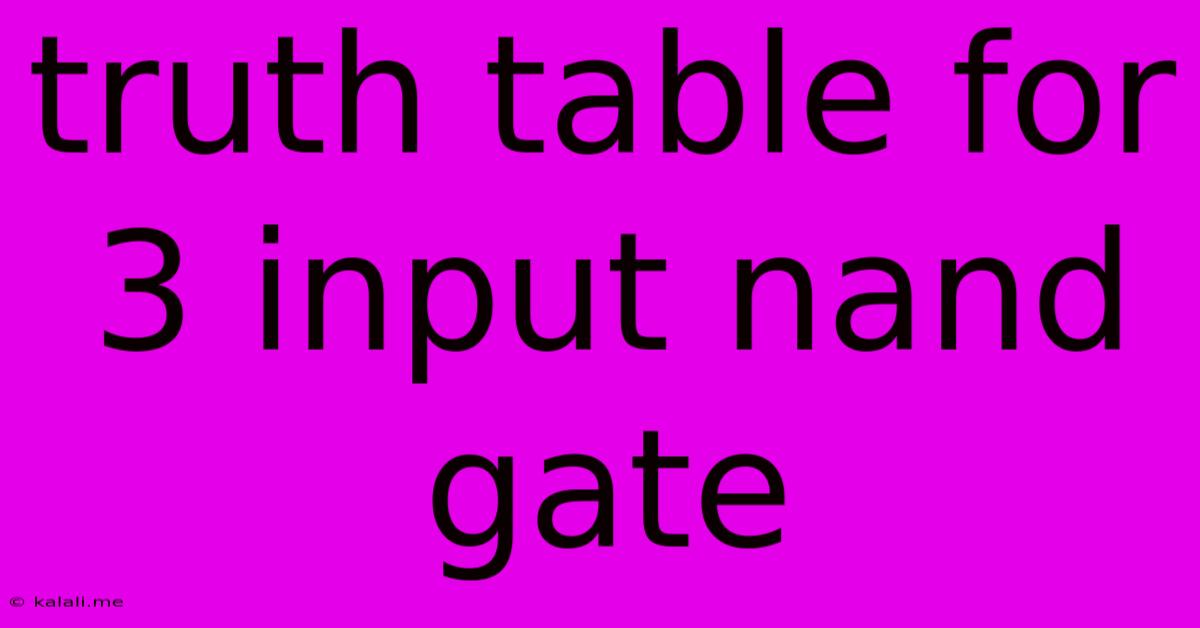Truth Table For 3 Input Nand Gate
Kalali
Jun 12, 2025 · 3 min read

Table of Contents
Truth Table for a 3-Input NAND Gate: A Comprehensive Guide
Understanding digital logic gates is crucial for anyone working with electronics, computer science, or related fields. This article provides a comprehensive guide to the truth table for a 3-input NAND gate, explaining its functionality and how to interpret its output. We'll also explore its applications and how it relates to other logic gates.
A 3-input NAND gate, like any NAND gate, performs a NOT AND operation. This means it outputs a 1 (high) only when all its inputs are 0 (low). Otherwise, it outputs a 0 (low). This seemingly simple functionality forms the basis of complex digital circuits. Let's delve into the truth table that visually represents this behavior.
Understanding the Truth Table Structure
A truth table systematically lists all possible input combinations and their corresponding outputs. For a 3-input gate, there are 2³ = 8 possible combinations (because each of the three inputs can be either 0 or 1). The table organizes these combinations and their resulting outputs for easy understanding.
The 3-Input NAND Gate Truth Table
Here's the truth table for a 3-input NAND gate:
| Input A | Input B | Input C | Output (A NAND B NAND C) |
|---|---|---|---|
| 0 | 0 | 0 | 1 |
| 0 | 0 | 1 | 1 |
| 0 | 1 | 0 | 1 |
| 0 | 1 | 1 | 1 |
| 1 | 0 | 0 | 1 |
| 1 | 0 | 1 | 1 |
| 1 | 1 | 0 | 1 |
| 1 | 1 | 1 | 0 |
Interpreting the Truth Table
Notice that the output is 1 in all cases except when all three inputs (A, B, and C) are 1. This highlights the core functionality: the NAND gate inverts the result of an AND operation. If the AND operation were performed first (A AND B AND C), the result would be 1 only when all inputs are 1. The NAND gate then inverts this, resulting in a 0 output in that single instance.
Applications of 3-Input NAND Gates
While seemingly simple, 3-input NAND gates are fundamental building blocks in more complex digital circuits. They can be used to:
- Implement other logic gates: Using combinations of 3-input NAND gates, you can create AND, OR, XOR, and other logic gates. This demonstrates their versatility as universal logic gates.
- Create complex Boolean functions: By connecting multiple 3-input NAND gates, you can create circuits that implement intricate Boolean functions.
- Design combinational logic circuits: These circuits are widely used in adders, multiplexers, and other digital components.
- Construct sequential logic circuits: While primarily used in combinational logic, NAND gates also form the basis for flip-flops and other sequential circuits.
Beyond the Basics: Understanding Boolean Algebra
Understanding Boolean algebra is key to manipulating and simplifying logic expressions involving NAND gates. Using Boolean identities, you can optimize circuits built using these gates, reducing the component count and improving efficiency. De Morgan's theorem is particularly useful in simplifying expressions involving NAND gates.
Conclusion
The truth table for a 3-input NAND gate provides a clear and concise representation of its functionality. Understanding this table and its implications is crucial for designing and analyzing digital circuits. The versatility of the NAND gate, its role as a universal gate, and its applications in various digital systems underscore its importance in the field of electronics and computer science. By mastering the fundamentals presented here, you can build a strong foundation for more advanced studies in digital logic design.
Latest Posts
Latest Posts
-
Which Earthquake Waves Are The Fastest
Jun 13, 2025
-
Router Works In Which Layer Of Osi Model
Jun 13, 2025
-
Choose The Correct Html Tag For The Largest Heading
Jun 13, 2025
-
What Is The Difference Between Sodium Bicarbonate And Sodium Carbonate
Jun 13, 2025
-
Which Of The Following Is Not An Antibiotic
Jun 13, 2025
Related Post
Thank you for visiting our website which covers about Truth Table For 3 Input Nand Gate . We hope the information provided has been useful to you. Feel free to contact us if you have any questions or need further assistance. See you next time and don't miss to bookmark.